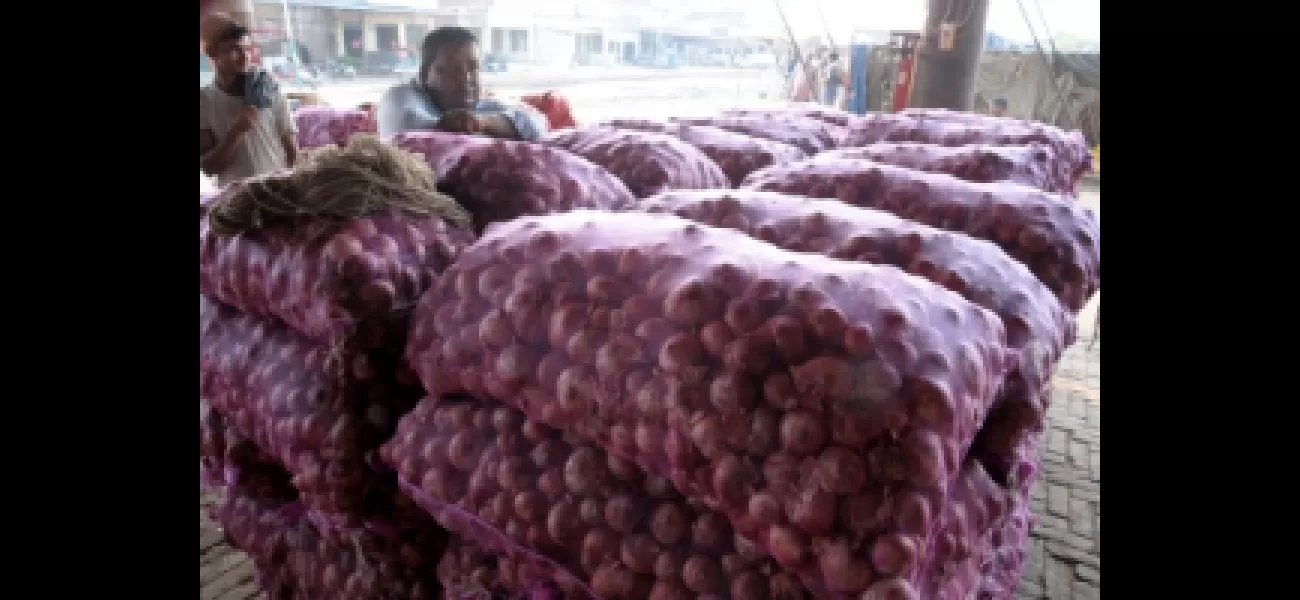The government sources say that the Election Commission's approval was obtained before lifting the ban on onion exports.
The Indian government has obtained permission from the Election Commission to resume onion exports during the Lok Sabha elections despite the Model Code of Conduct.
May 5th 2024.

According to sources, the Centre has received permission from the Election Commission to lift the ban on onion exports during the Lok Sabha elections. The Department of Revenue, under the finance ministry, had requested the permission subject to certain conditions, including a 40% export duty and a minimum export price of $550 per tonne.
This decision to lift the ban is expected to benefit a large number of farmers, especially in key producing regions like Maharashtra. The government has imposed a minimum export price of $550 per tonne and a 40% export duty, which means that the shipments cannot be sold for less than $770 per tonne.
The recommendation to lift the ban was made by the Department of Consumer Affairs, which closely monitors the availability and prices of onions in the country. The ban was initially imposed in December last year to control the rising retail prices and concerns over a decrease in production. On average, the country exports between 17 lakh to 25 lakh tonnes of onions annually.
However, according to Consumer Affairs Secretary Nidhi Khare, the lifting of the ban will not lead to an increase in retail prices. She assured that the government is committed to protecting the interests of both consumers and farmers. In a notification on May 4, the Directorate General of Foreign Trade announced that the export policy of onions has been amended from prohibited to free, subject to a minimum export price of $550 per metric tonne. The previous day, the finance ministry had imposed a 40% export duty.
This decision is especially significant as it comes just before the crucial Lok Sabha elections in key onion-producing regions like Nashik, Ahmednagar, and Solapur in Maharashtra. The farmers in these regions have been demanding the lifting of the ban so that they can get a better price for their produce.
Khare explained that the ban has been lifted because the supply situation is comfortable and prices are stable in both mandis and retail markets. The modal price at Lasalgaon mandi in Nashik was Rs 15 per kg in April. She added that this decision was made after considering the latest estimates of onion production in the rabi season, which stands at 191 lakh tonnes, and taking into account the availability and prices of onions in global markets.
She also mentioned that the monthly domestic demand for onions is around 17 lakh tonnes and lifting the ban will encourage farmers to grow more onions. With the forecast of a good monsoon, the government is confident that this decision will not lead to any price rise.
Khare emphasized that this decision was made after extensive discussions with stakeholders and a high-level team visited key onion-producing belts in Maharashtra to assess the ground situation. She also highlighted the need for exporting onions due to their short shelf life.
In addition, the government has also procured 5 lakh tonnes of onions as a buffer stock to intervene in the market in case of a price rise. Khare assured that the government is continuously monitoring the prices of all essential food items and will take necessary steps to keep them under control.
A senior government official clarified that there is an inter-ministerial committee that reviews the prices, production, availability, and export of essential food items, including onions. They stated that this decision was not made in isolation and that the IMC has been taking various steps to boost domestic supply and control prices in commodities like wheat and rice.
In March, the Union Agriculture Ministry released data stating that onion production in 2023-24 is expected to be around 254.73 lakh tonnes, which is lower than the previous year's production of 302.08 lakh tonnes. This decrease is primarily due to a decrease in output in states like Maharashtra, Karnataka, Andhra Pradesh, and Rajasthan.
Last month, the Ministry of Consumer Affairs, Food and Public Distribution announced that the government has allowed the export of 99,150 tonnes of onions to six neighboring countries. However, the Congress party has accused the government of neglecting the farmers in Maharashtra affected by the ban on onion exports. They stated that their manifesto promises a predictable import-export policy to prevent such last-minute decisions from negatively impacting farmers.
Overall, the decision to lift the ban on onion exports has been made after careful consideration and consultations with all stakeholders. The government has taken this step to benefit farmers and keep the prices of onions stable in both domestic and global markets. They will continue to monitor the situation and take necessary measures to ensure the availability and affordability of essential food items in the country.
This decision to lift the ban is expected to benefit a large number of farmers, especially in key producing regions like Maharashtra. The government has imposed a minimum export price of $550 per tonne and a 40% export duty, which means that the shipments cannot be sold for less than $770 per tonne.
The recommendation to lift the ban was made by the Department of Consumer Affairs, which closely monitors the availability and prices of onions in the country. The ban was initially imposed in December last year to control the rising retail prices and concerns over a decrease in production. On average, the country exports between 17 lakh to 25 lakh tonnes of onions annually.
However, according to Consumer Affairs Secretary Nidhi Khare, the lifting of the ban will not lead to an increase in retail prices. She assured that the government is committed to protecting the interests of both consumers and farmers. In a notification on May 4, the Directorate General of Foreign Trade announced that the export policy of onions has been amended from prohibited to free, subject to a minimum export price of $550 per metric tonne. The previous day, the finance ministry had imposed a 40% export duty.
This decision is especially significant as it comes just before the crucial Lok Sabha elections in key onion-producing regions like Nashik, Ahmednagar, and Solapur in Maharashtra. The farmers in these regions have been demanding the lifting of the ban so that they can get a better price for their produce.
Khare explained that the ban has been lifted because the supply situation is comfortable and prices are stable in both mandis and retail markets. The modal price at Lasalgaon mandi in Nashik was Rs 15 per kg in April. She added that this decision was made after considering the latest estimates of onion production in the rabi season, which stands at 191 lakh tonnes, and taking into account the availability and prices of onions in global markets.
She also mentioned that the monthly domestic demand for onions is around 17 lakh tonnes and lifting the ban will encourage farmers to grow more onions. With the forecast of a good monsoon, the government is confident that this decision will not lead to any price rise.
Khare emphasized that this decision was made after extensive discussions with stakeholders and a high-level team visited key onion-producing belts in Maharashtra to assess the ground situation. She also highlighted the need for exporting onions due to their short shelf life.
In addition, the government has also procured 5 lakh tonnes of onions as a buffer stock to intervene in the market in case of a price rise. Khare assured that the government is continuously monitoring the prices of all essential food items and will take necessary steps to keep them under control.
A senior government official clarified that there is an inter-ministerial committee that reviews the prices, production, availability, and export of essential food items, including onions. They stated that this decision was not made in isolation and that the IMC has been taking various steps to boost domestic supply and control prices in commodities like wheat and rice.
In March, the Union Agriculture Ministry released data stating that onion production in 2023-24 is expected to be around 254.73 lakh tonnes, which is lower than the previous year's production of 302.08 lakh tonnes. This decrease is primarily due to a decrease in output in states like Maharashtra, Karnataka, Andhra Pradesh, and Rajasthan.
Last month, the Ministry of Consumer Affairs, Food and Public Distribution announced that the government has allowed the export of 99,150 tonnes of onions to six neighboring countries. However, the Congress party has accused the government of neglecting the farmers in Maharashtra affected by the ban on onion exports. They stated that their manifesto promises a predictable import-export policy to prevent such last-minute decisions from negatively impacting farmers.
Overall, the decision to lift the ban on onion exports has been made after careful consideration and consultations with all stakeholders. The government has taken this step to benefit farmers and keep the prices of onions stable in both domestic and global markets. They will continue to monitor the situation and take necessary measures to ensure the availability and affordability of essential food items in the country.
[This article has been trending online recently and has been generated with AI. Your feed is customized.]
[Generative AI is experimental.]
0
0
Submit Comment





